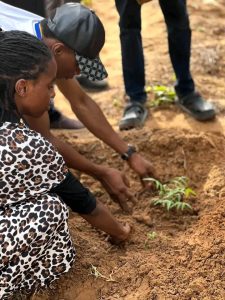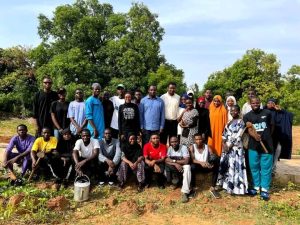By Abdulrasaq Kamaldeen

Northern institutions like UDUS where temperature regularly climbs above 40 degrees Celsius, face challenges due to climate change—impacting students’ daily routines.
For this, the members of Junior Chamber International-UDUS, along with other dedicated students took matters into their own hands in July morning, launching green initiatives to maintain a cool environment and well-being of students.
The transformative plantation exercise stretched along the walkway from the Jatau bridge to the bus stop—turning a sun-baked path into a shaded refuge.
Among the volunteers, Imam Taofeeq, a 400-level and the current vice president of the association, shared his thoughts with this reporter.
In his words: “In an environment like Sokoto, most times, the sun rises above 40 degrees Celsius and the need to mitigate climate change cannot be underestimated by planting these trees. It will help in covering up the walk easily and as well ease the hot weather into a more cool environment.”
Taofeeq maintained that there are a few resources battling the association that have been a hindrance to the proper execution of the project, though there is a loom of volunteers that partake under the supervision of Prof. Jimoh Olaiye Amzat.
“Untargeted numbers of resources and volunteers, though people turned out in large numbers and we appreciate was carried out by volunteers, JCI members, and staff advisers, and as well our brand awareness attracts people from outside the University to join the climate change action.”
Environmental Regulation by Trees
Food and Tree for Africa, FTFA, an organization that addresses food security, environmental sustainability, and greening, emphasized that the importance of planting trees cannot be underrated in instances of climate change, global pandemics, and social unrest.
“Trees are fundamental to life. They are ecosystem engineers for the great forests, providing habitat for innumerable plant and animal species. They help to filter rainwater, improve water quality, and provide a host of other ecosystem services.”
Trees also represent a form of natural capital and a key tenet of green infrastructure, while they equally regulate environmental processes like climate regulation, pollination, and air quality, according to an article published by Radio Nigeria.
Also of immense advantage are the aesthetic experiences, recreational activities, and associated well-being and health benefits offered by green areas, particularly those covered with trees.
The National Forest Foundation said, humans inhale oxygen and exhale carbon dioxide, while trees do the opposite as their leaves pull in carbon dioxide, water, and energy from the sun to turn into sugars that feed the tree. This process, which is known as photosynthesis, emits oxygen.
Other Advocates for Climate Change
Imam Taofeeqah Ahmad, a 500-level Animal science student thrilled to participate in the project by contributing positively to climate change, stating that “the project is for community development and service to humanity”.
“I feel great and very excited because I am contributing positively to climate change and it was such a good experience for me. The turn-ups were encouraging as well.”
“As a member of the great organization, I volunteered because I believe in community development and “rendering service to humanity is the best work of life.”

Adedeji Jubril Abisade, a 400-level computer science student and General Legal Counsel of the association UDUS emphasized the reason behind the project.
“The reason behind planting the trees is to reduce the harsh climate change, especially during the hot season and it is the only simple way to do so and there might be other ways. And the challenge we faced is the raising of funds.”
Another participant, Usman Kabiru Sonfada, a 500-level Animal Science student and Treasurer of the association, accentuated the purpose of the plantation project on campus.
According to him, Sokoto’s scorching heat often makes it challenging for students to attend lectures comfortably. That is why JCIN UDUS initiated a tree planting project that aims to provide a cooler and more conducive environment for students to learn and thrive.
“ We hope to create shaded areas and a natural canopy that will reduce the temperature and make the campus more habitable.
“We plant trees for the future generations of students who will come to Usmanu Danfodiyo University, just like some individuals have planted trees around the school environment which we are enjoying the benefits of now. By planting trees, we hope to take part in climate action, mitigate the effects of irregular rain, prolonged dry periods, and excessive heat, and contribute to a more sustainable future for our environment and the Globe.
“After consulting some environmentalists on where best to carry out the tree-planting project around campus. They gave us some very important sites that needed natural canopies and shading. Thanks to the Dean and lecturers from the Faculty of Agriculture. The project was carried out along the new walkway that connects the Bus Stop and the old walkway.”
He also mentioned the challenge of combating the association during the execution of the project. “We wanted to plant 100 Trees but unfortunately, we weren’t able to get 50 seedlings. The seedlings were donated by the Sokoto State Ministry of Environment. The new Faculty of Engineering was part of the site selected for the Tree planting project, unfortunately, we were unable to because of insufficient seedlings.”
Yusuf Abdulrazak, a 100L microbiology student said, “planting of trees gives shade and shelter as well as fresh air and oxygen. Also, it Improved mental health, well-being, opportunities for outdoor learning and exploration, and a sense of connection to nature and the environment.”
Aminu Ahmad Yasir, a 200L law student also contributed saying, “It reduces temperature and it’s a good place for resting, and the breeze cools down everywhere. No noise to disturb you over there and you can relax well.
“The place serves as an abode for us when our rooms are overheating and if we can’t sleep we always go under the tree shade. How I feel while walking under the tree is unexplainable because I can’t express it in words or can’t just put it into writing.”
International and Local Partnership to Green Wall Initiative
On 1st, February 2022, former Minister of Environment, Sharon Ikeazo, disclosed that the National Afforestation Programme under the green bond project has successfully forested 6,191,363 hectares of land through the green bond project implemented by the Forest Research Institute of Nigeria, FRIN, National Agency for Great Green Wall, NAGGW, Department of Desertification, Land Degradation and Drought Management, National Parks Service, NPS, NGOs, state governments, private planters, and international stakeholders.
“In addition, a total of 6,550,056 seedlings were raised, distributed to state governments and institutions, and planted by the Forest Research Institute of Nigeria, FRIN, Federal Department of Forestry, Nigeria Conservation Foundation, NCF, and Tree Restoration and Planting Company in 2020 under the Forestry Trust Fund Initiative,” agency said.
